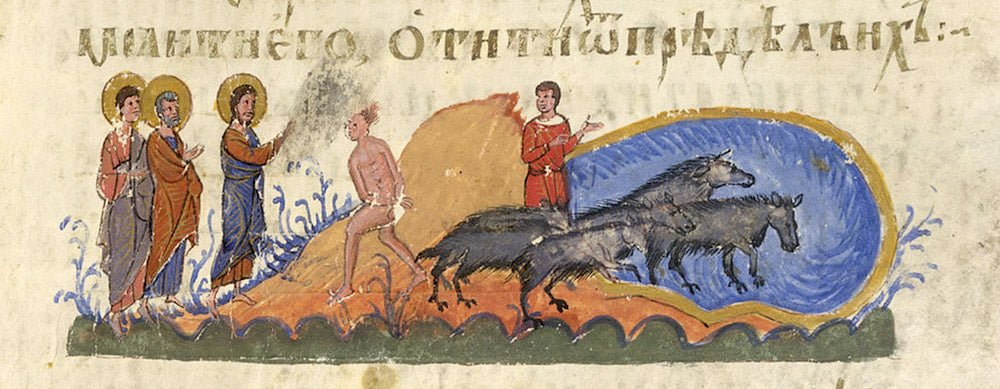The Easy Yoke of Christ - Homily for the 20th Sunday after Pentecost (2024)

In today’s Gospel lesson, we heard how Christ comes to save a man tormented by the thousands of demons inside him. This possessed man was driven out of human society. The other Gospels report two such men, but really, there is no communion in evil. Two wicked men together are not a company. In separating themselves from God, they truly are separated from each other as well, despite seeming evidence to the contrary. In the description of the man possessed by a legion of demons, the Gospel portrays so vividly the effects of sin on man. Sin leaves a man insane, naked, and alone, a walking corpse living amongst the tombs.
What do we hear from this possessed man? In one sense, nothing. The demons speak through him and exclaim to Christ “What have I to do with thee, Jesus, thou Son of God most high? I beseech thee, torment me not.” (Lk 8:28). “Torment me not!” thus we hear from the lips of this possessed man the cry of unbelievers and scoffers in our days who believe that Christ and His Church torment mankind. If it were only that this possessed man was in such a state and otherwise was silent, we would have enough cause for pity. But that this man, so thoroughly tormented by demons, should think that Christ, the Lover of mankind and Savior of the world, has come to torment him highlights how immeasurably far away he is from God. He is so twisted in his soul that he should think that God in His goodness is the tormentor of mankind.
“Torment me not!” The world and those seduced by it have always been at enmity with Christ. The world believes that we are tormented because our desires are not satisfied. So the world seeks the solution in indulging the passions. Therefore, it’s not surprising they think that Christ came to ruin our fun. Christ came to make us feel guilty. Christ came to bring us weakness and slavery and death. Christianity is only seen for its list of “no’s”. No, you can’t eat whatever you want whenever you want. No, you can’t leave your spouse for someone else. No, you can’t do drugs. No, you can’t stay out late on Saturday, you have to come to church on Sundays. No, you shouldn’t use foul language. No, you can’t do whatever you want all day, you have to set aside time for prayer. No, you can’t do whatever you want with your body. No. No. No.
And yet, if we look closely inside ourselves, this same cry “Torment me not!” we find in our hearts whenever we come up against Christ’s commandments. Whenever an inner resistance to doing what we know is right surfaces in our mind. We prefer the self-inflicting pain of our sinful desires and bad habits over the “torments" that we in our delusion assume the works of following the Gospel commandments entail.
However painful a life of virtue is, it is much less tormenting than being enslaved to the passions, to every passing whim and fancy of our minds, to be held captive to demons. Christ comes to heal us of our grievous wounds, our disordered minds, and our fractured, isolated, alienated lives. He does so by giving us His commandments. If we look at spiritual things from the proper perspective, we see that Christ’s “commandments are not grievous” (1 Jn 5:3). Fasting can be painful or irritating, but it’s less painful than burning with lust. Bearing criticism and correction can smart, but if we accept it with humility, the pain can go away in a few minutes. Or, if we choose to, we can burn in the fire of our wounded pride and self-pity for days or weeks (and for some people, months or years). People-pleasing might feel good in the moment, we might bask in the affection of others that was bought at the price of our integrity. St. John Chrysostom rightly exposes that vainglory puts us in slavery to everyone we meet. Always fulfilling the demands of others, not for the sake of the Gospel, but for the sake of the praise of men. Tithing to the church and giving alms might hurt our wallet but the anxiety caused by trusting in money and not in God is a pain far more agonizing.
And so we are rightly persuaded to choose virtue over vice even if there were no recompense for it in the next life. Sinners are always in a state of agitation, waiting for their next “fix” whatever form that might take. What greater torment can there be than to always be expecting pleasure for things of this life, but to only rarely have it satisfied? Perhaps in one sense, the only difference between their state and that of the damned is that eventually the rarity of satisfaction disappears into “never again”. The saints, however, were at peace with God and with those around them, regardless of their circumstances. Like St. Paul, they can say “I have learned, in whatsoever state I am, therewith to be content. I know both how to be abased, and I know how to abound: every where and in all things I am instructed both to be full and to be hungry, both to abound and to suffer need. I can do all things through Christ which strengtheneth me.” (Ph. 4:11-13). This is the state Christ desired for the man out of whom He exorcised the legion of demons. This is the state He desires for us as well, if only we truly believe Him when He says that His yoke is easy, and His burden is light. Amen.


Leave a comment